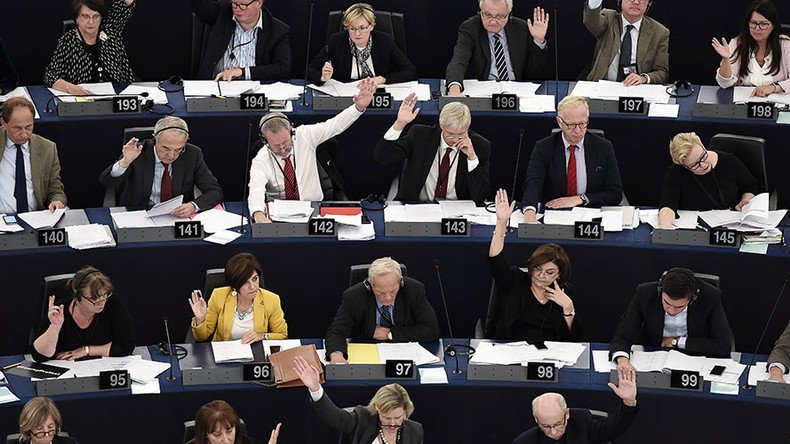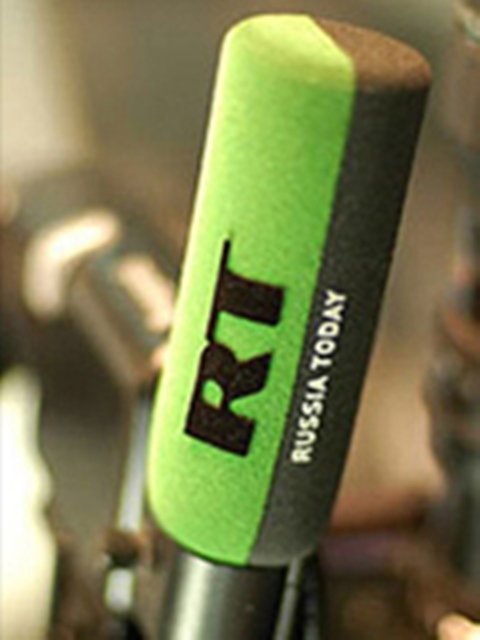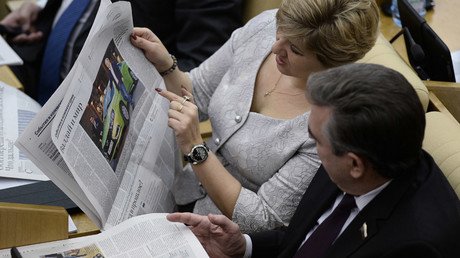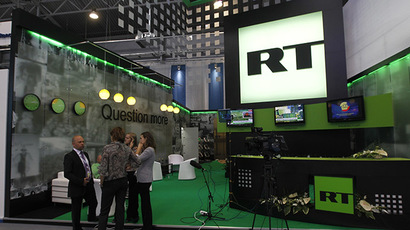EU Parliament promotes democratic values by lumping journalists in with terrorists

MEPs have voted on a resolution that likens threats from the Russian media to those from ISIS.
Monday’s resolution from members of the Foreign Affairs Committee of the European Parliament began with a statement saying “Hostile propaganda and disinformation directed against our societies by both the Kremlin and non-state actors such as ISIS/Daesh is a fact.”
There was a time when the EU regarded both Russia and America as “partners” – including in the fight against terrorism. But in recent years, the bloc has moved almost completely into the US camp and a number of statements issued from Brussels seem to indicate it regards Russia as nothing but an enemy alongside those extremists.
Apparently as the MEPs see it, shouting down Russian media for carrying alternative opinions is the first step in safe-guarding “Western democratic values.”
Monopoly on Truth
Of course, the EU representatives aren’t saying all outsiders are bad. The American media has had a massive presence in Europe for decades. This ranges from CNN being a staple of cable packages, to European newspapers & broadcast outlets using US-owned wires for breaking news and features content, to print editions of US newspapers being widely available in across the continent. Not to mention Washington’s state broadcasters – the BBG-run VOA and RFE/RL.
Is this influence whiter than white? Do these outlets have confident ownership of truth?
The statement by MEPs warns that “hostile propaganda against the EU and its member states seeks to distort the truth, provoke doubt, divide the EU and its North American partners, paralyze the decision-making process, discredit the EU institutions and incite fear and uncertainty among EU citizens.”
Let’s look at the time when practically all leading US print and broadcasting outlets claimed Saddam Hussein had weapons of mass destruction and used this not only as an excuse for going to war in Iraq, but also as useful emotional pressure on Europe to join in. Was that not “disinformation” and was it not an attempt to “incite fear and uncertainty among EU citizens?”
Yet Eurocrats have never emoted about US dissemination of inaccurate news to Europe, even when it’s clearly promoted by intelligence agencies, as in the infamous WMD case.
Looking for a more recent example? How about the unbridled euphoria emanating for months from the speeches of Western politicians and the pages of the media alike over the social unrest in the Middle East in 2010-2012? Should their reluctance or downright refusal to soberly assess and communicate the risks of regional instability be considered harmful disinformation, considering the consequences – from immigration crisis to security – reverberating throughout the world today?
A Word on ISIS
Speaking of security: for all the absurdity of the MEP’s statement, one part of it rings true: “Islamic terrorist organizations are actively campaigning to undermine and increase the level of hatred against European values and interests,” says the resolution.
Indeed, they are also trying to do the same to Russia, which is actually engaged in combat against them in Syria. And Russia has arguably suffered more from Islamic terrorism than any other European country. But instead of suggesting cooperation with Russia to combat this menace, the EU lobs it in with a group that it’s fighting, while EU countries take part in a US-led coalition more concerned with regime change.
David and Goliath
The European Parliament committee lists the many tools employed by Russia to supposedly influence the political processes in Europe. Problem is, substitute every mention of Russia/Moscow/Kremlin for USA/Washington, and the claims of interference ring far truer.
To wit: “MEPs are concerned about the rapid expansion of Kremlin-inspired propaganda. They note how ”the Russian government is aggressively employing a wide range of tools and instruments, such as think tanks [...], multilingual TV stations (e.g. Russia Today), pseudo-news agencies [...], social media and internet trolls, to challenge democratic values, divide Europe, gather domestic support and create the perception of failed states in the EU’s eastern neighborhood.”
Let’s break down this propaganda cornucopia.
The US employs dozens of think tanks all over Europe (examples include the German Marshall Fund, the Atlantic Council and CEPA) which are often funded by, in addition to the State Department and the Department of Defense, American weapons manufacturers. Coincidentally, these are the entities that stand to gain the most from escalating tension with Russia, as fighting talk leads to greater military spending in the NATO area.
Of “multilingual television stations,” [of which there is literally one] “Russia Today” is available in two European languages, English and Spanish, with digital content in French and German. Compare this to other state-funded actors. The BBG’s VOA and RFE/RL are available in English, Russian, Ukrainian, Belarusian, Serbian, Macedonian, Albanian, Azeri, Georgian, Kazakh, Tajik, Kyrgyz and Uzbek, Which is quite a collection of tongues. Meanwhile, the British state broadcaster BBC makes its news available in Russian, Turkish, Ukrainian, Azeri, French, Spanish, Portuguese, Uzbek and Kyrgyz. EU officials have no difficultly with this, despite London's impending withdrawal from their bloc.
This, of course, does not include the EU’s own news giants, from Euronews, France24 and Deutsche Welle available on TV in multiple languages, to each country’s local news channels, to thousands of native newspapers, magazines, radio stations and so on, and so on, and so on…
The MEPs also bring up everyone’s favorite practically-literal boogeyman: Russian online trolls. This is based on a series of articles from two years ago all about the same office in St Petersburg, which allegedly employs a couple of hundred contractors to write online comments in poor English. Even if true, just compare that to the UK’s “Facebook warriors” of 1,500 highly trained and well paid soldiers, for instance. What are the chances that NATO or the US doesn’t have the same counterparts?
MEPs vs. Reality
And what of the claims that Russia has tried to “create the perception of failed states in the EU’s eastern neighborhood?” According to the MEPs it must be the Russian media’s fault the Baltic States have lost a huge chunk of their people since joining the EU in 2004 (Latvia's population has dropped by 12.8 percent and Lithuania by 15.3 percent in those twelve years). Or that in Ukraine, long before the Maidan crisis, living standards were lower than they were in 1991, when the USSR collapsed.
If the legion of aforementioned media outlets, lavishly funded think tanks and thousands-strong state-sponsored communication initiatives fail to convince their own people that all is hunky dory in the neighborhood, placing the blame at the feet of RT, Sputnik and a couple of hundred people writing “Putin is great!” in comment chains is absurd on its face.
There is a reason RT resonates with European audiences: the realities the channel reports on are the same ones they witness with their own eyes. EU officials are free to shout “propaganda” to their hearts’ content while concocting ways to limit their constituents’ access to information. Yet, it won’t resolve the underlying problems facing European society that, when not properly reflected in the establishment approved media, are causing the people to seek out alternative sources of news.
All in all, the MEP’s resolution is a rather peculiar interpretation of the much-touted democratic values, particularly that of freedom of speech – which in action means attacking a rare voice of dissent among literally thousands of European media outlets. If anything is eroding public confidence in European institutions, it's that.
The statements, views and opinions expressed in this column are solely those of the author and do not necessarily represent those of RT.
















